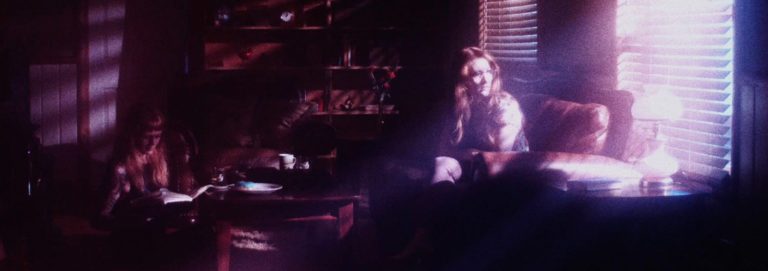A Black Rift Begins to Yawn (2021 | USA | 102 minutes | Matthew Wade)
It’s hard to adapt Lovecraft on film. Not many have done it successfully, although it’s always interesting to watch the attempts. Matthew Wade’s entry to this venerable canon chooses, instead of direct literal adaptation, to take its title from H.P. Lovecraft’s 1936 novella, The Shadow Out of Time, and jump off from there into its own flights of fancy.
It’s not easy to describe what exactly happens in this film or what it’s about, because it seems to be aggressively intent on staying vague and indeterminate. Two women have met up at a remote cabin to go through the notes of an apparently-deceased man regarding some tapes he seems to have been examining. From his notes, which the women read aloud, it seems that his interest was at first scientific but that something on those tapes ate away at his emotional core and drove him mad, probably leading to his death. Who are these three people to each other? The film never tells us. Its description on Local Sightings’ site calls them “former classmates”, which I guess I’ll have to take at its word, but that certainly isn’t explicit in the narrative. It’s clear all three are academic professionals, some sort of mix of scientists and archivists. The two women look enough alike that my first assumption was that they were sisters, and from there surmised maybe the absent man was their father, but when I learned (well over an hour in) that their names were “Laura” and “Lara” (played by Sara Lynch and the incredibly-named Saratops McDonald) I threw that idea out the window. Maybe he was their professor, or maybe a colleague?
By the end, I didn’t feel any closer to understanding the basic facts of the situation here than I did at the beginning, but I definitely did feel washed under by a steady stream of dreamy visuals, time folding in on itself, identities questioned, and a small amount of slightly gratuitous-feeling nudity.
A reading in the climactic scene from the dead man’s notebook provides the only real expository clarity the film has to offer, and to be honest it raises more questions than it answers, but at least it does provide some context to reframe the somewhat disjointed images and possibly non-linear action we’ve been seeing. The fact that so much of the film’s dialogue comes from the readings (usually off-camera or in voice-over) of these notebooks, which have a distinctly Lovecraftian bent to their tone, makes this work feel like it’s still a literary adaptation even if it technically isn’t one.
Matthew Wade is not only the writer and director of this film: he also produced it, edited it, did the color grading, and composed the entire haunting and sometimes overpowering score. Most other behind-the-camera roles are credited to Sara Lynch, who, in addition to co-starring, also produced and did the film’s costume and production design.
A huge percentage of the film’s runtime is occupied by static long shots in patience-trying long takes: of people staring off into the mountainous landscape, or just the landscape itself, usually shadowed by Instagram-filter-style vignetting and infused with heavy blue and pink lighting. It’s easy to get sucked into the drone of the soundtrack and the cohesive visuals, to allow oneself to be hypnotized into a dreamlike state almost in the same way we see these characters being affected by their work and surroundings.
One scene breaks this convention with a dramatically handheld camera, and another removes that characteristic color scheme, but in both cases it feels like those breaks from the film’s norms think they’re signifying more than is actually communicated – and as soon as those scenes end, we’re reset right back into that now-familiar cinematic language once again.
Ultimately, this is a film that is all about its aesthetics. Go in looking for a discernible plot, or a mystery to unravel in a satisfying way, and you’ll be disappointed. But if you’re up for 100 minutes of cosmic horror and a vague intimation of some lurking ancient evil just below the surface of reality, you’ll find what you’re looking for. It’s a tone poem, and that tone is unmistakably Lovecraftian.
A Black Rift Begins to Yawn played in-person on September 17th at the Local Sightings Film Festival, but is available virtually through September 26th.
Follow other updates from this year’s festival via our Local Sightings 2021 coverage.




